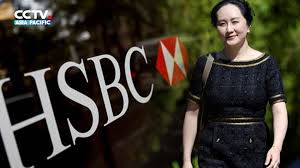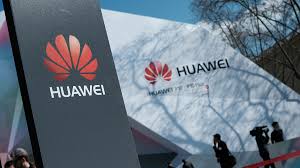HSBC ‘accomplice’ of US political scheme against Meng Wanzhou

Beijing: The lawyers of Meng Wanzhou, CFO of Chinese telecom giant Huawei, accused the U.S. authorities of misleading the Canadian court overseeing the Huawei chief financial officer’s extradition hearing, referring to new court filings released.
Meng’s lawyers submitted content omitted in the U.S. records of the case, as well as emails between Huawei and HSBC as proof that Huawei’s CFO did not commit fraud, or violate U.S. sanctions laws against Iran.
The lawyers alleged there was a destruction of the integrity of the judicial process by U.S. President Donald Trump and other senior members of the administration by their intention to use Meng “as a bargaining chip in a trade dispute.”

Meng’s lawyers claimed in their summary that U.S. authorities omitted key parts of a PowerPoint presentation delivered by Meng in 2013 to an HSBC banker in Hong Kong.
The PowerPoint presentation is now the key piece of evidence presented by the U.S. government in support of its accusation that Meng committed fraud by misleading HSBC into processing U.S. dollar transactions for Skycom, an Iranian company Huawei lists as a “business partner.” Such transactions would make the bank liable to fines under U.S. sanctions laws against Iran.
Lawyers submitted a copy of the presentation that highlighted the omitted slides, numbered 6 and 16.
The slides state that “as a business partner, Skycom works with Huawei in sales and services in Iran” and that “Huawei conducts normal business activities in Iran” and also works with other entities in the country.
Meng’s lawyers also questioned U.S. claims that only junior HSBC employees were aware of the relationship between Huawei and Skycom, and that senior employees did not know, which holds a bizarre logic behind it.
They provided emails between Huawei and HSBC showing that early in 2011, a number of HSBC’s senior vice presidents and vice presidents knew of the relationship between Huawei and Skycom.
Meng’s lawyers said the omissions and misrepresentations are serious, adding that U.S. conduct has fallen “so far below expected standards of diligence, candor and accuracy as to constitute a serious breach of process.”
They also contend that HSBC had the option of clearing U.S. funds through the Clearing House Automated Transfer System (CHATS), an alternative transaction-clearing system based in Hong Kong, which they say “involves no U.S. sanctions risk.”
“The bank would be responsible for the method in which a payment is processed, not its customer,” went the testimony of John B. Bellinger, partner of Arnold & Porter law firm.
“There are several different ways in which a U.S. dollar payment may be made, and settled by parties located outside of the U.S., without involving the U.S. financial system. USD CHATS is one particularly notable example,” was the testimony of Eric Wong Wing Him, retired Standard Chartered Bank senior manager.
Court hearings of the new evidence is expected next March.
Meng was arrested in December 2018 at the Vancouver International Airport on a warrant from the United States.
She is accused by the U.S. authorities of bank fraud for misleading HSBC about Huawei’s relationship with a company operating in Iran, putting HSBC at risk of fines and penalties for breaking U.S. sanctions on Tehran. Both Meng and Huawei have repeatedly denied any wrongdoing.
Meng’s lawyers alleged that Canadian Prime Minister Justin Trudeau also politicized the extradition, by linking Meng’s potential release to two Canadians – businessman Michael Spavor and Michael Kovrig, a former diplomat – who were detained in China just days after her arrest and who were recently charged with suspected espionage.
Meng is the daughter of billionaire Ren Zhengfei, the founder of Huawei, the company at the center of next generation 5G wireless technology and a long-running dispute with the Trump administration.
Meng is fighting extradition to the United States and has said she is innocent. She has been in house arrest in Vancouver since her detainment.
The extradition hearings are scheduled to wrap up in late April 2021, although both sides will be able to appeal the final decision.
In May a judge in British Columbia’s Supreme Court ruled that the standard of double criminality had been met, meaning that the Canadian attorney general’s case to extradite her cleared the first hurdle.
Chinese Foreign Ministry spokesperson Zhao Lijian said in May that China expresses its strong dissatisfaction and firm opposition to a Canadian court’s ruling on the case against Meng, and has made solemn representations to Canada on the issue.
Last month, Zhao said that the case is a “serious political incident,” which has revealed the U.S.’s political calculations to purposefully suppress Huawei and other Chinese tech companies.
On June 15, Meng’s lawyers filed a memo of arguments with the Supreme Court of British Columbia to fight extradition to the United States on bank fraud charges.





